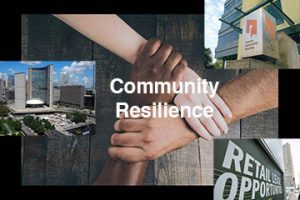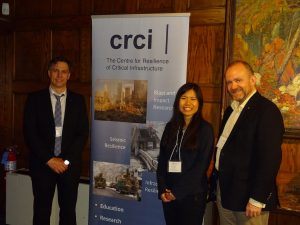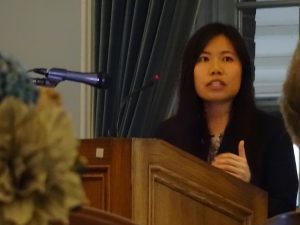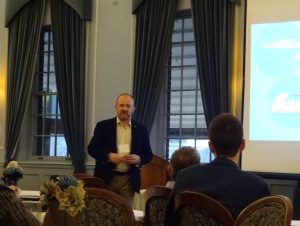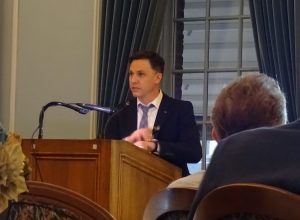Municipal Corporation, Community Housing and Commercial Real Estate: Three Inherent Fragilities in Community Resilience
The meeting on May 3, 2018 looked at three inherent fragilities in community resilience.
Alec Hay, Sharon Lam and Steven Norris discussed various aspects of frailness in and hazards to community resilience as well as possible tools to assess municipal preparedness to these threats.
Speakers:
Alec Hay
The field of operational resilience is evolving rapidly as the converging trends in climate, technology and demographic changes increase the consequences of loss, and beyond the capacity of current standard practices to address. We need to rethink our approach to infrastructure planning, while avoiding the very real risk of stranded assets. We need to plan reasonably. Alec Hay will explore some of the recent developments in operational resilience and discuss emerging concepts and new research.
Founding Principal of Southern Harbour, based in Toronto, Alec was previously the Resilience & Security leader at DIALOG, before which he served 25 years in the British Royal Engineers. A graduate of the University of Edinburgh and the Royal School of Military Engineering, he specialised over the last 30 years in fortifications and infrastructure development, which he practised around the World. He is an adjunct professor at the University of Toronto Centre for Resilience of Critical Infrastructure, where he focuses on operational risks and resilience of complex infrastructure systems and their socioeconomic influence. He speaks internationally on infrastructure risk and resilience, and is past chair of the BOMA Toronto climate change resilience committee. Author of numerous books, articles and research papers and a director of Rethink Sustainability Initiative, he is a Principal and International Secretary of the Register of Security Engineers and Specialists.
Sharon Lam - Climate Change Preparedness of Critical Infrastructure: An Assessment Framework
Climate change poses a broad range of risks to the normal functioning of critical infrastructure, such as utilities and transportation systems. These systems are fundamental for the ongoing health, safety, security and socioeconomic well-being of society. Breakdowns in one system can quickly cascade through networks of interconnected systems across sectors and spatial scales, leading to broad and potentially catastrophic impacts on large segments of society. Increasingly, the City of Toronto, Provincial and Federal governments have recognized the need to incorporate consideration of climate change impacts on current and planned critical infrastructure. To help guide how to build climate resilience capacity within and across these systems, the Climate Change Preparedness Assessment Framework has been developed, drawing upon research from a variety of fields and feedback from a wide cross-section of practitioners in Canada. In this presentation, Sharon will be sharing ideas that she has gathered through her research on how to assess climate change preparedness, and propose recommendations for the way forward.
The Assessment Framework has been developed as part of Sharon’s graduate research project in the Department of Geography and Planning at the University of Toronto under the supervision and advisory of: Dr. Virginia W. Maclaren (Associate Professor, University of Toronto), Alec H. Hay (Adjunct Professor, University of Toronto; Principal, Southern Harbour), and David T. MacLeod (Senior Environmental Specialist, City of Toronto). The presentation slides can be found here.
Sharon is a recent graduate of the Master’s in Planning program in the Department of Geography and Planning at the University of Toronto. She has formerly worked with Health Canada’s Climate Change and Innovation Bureau and the Toronto and Region Conservation Authority. She has also contributed to a number of academic research projects including a review of ecosystem services in municipal land use planning policies, and a review of the relationships between city trees and human health. With a passion for tackling complex challenges such as climate change and inequality, she is committed to advancing change for healthier, more sustainable and resilient cities for all.

Steven Norrie, Senior Transmission Planner
The IESO is the provincial agency responsible for the planning and real-time operation of Ontario’s interconnected electricity grid. Drawing from his experience as a power system planner, Steve will provide an overview of changes that he foresees will alter how resilience of electricity service is considered when planning the power system of the future. These changes include the evolution of distributed energy resources, changing customer expectations, extreme weather, and an aging power grid.
Steven Norrie is a Senior Transmission Planner with Ontario’s Independent Electricity System Operator (“IESO”). In this role, Steve leads the development of electric power system plans for the Toronto Region, and has led planning assessments related to sustainability, extreme weather risk, and transmission system resilience.
Steve joined the IESO’ power system planning group in 2005. He has also held roles within the area of conservation and demand-side management, and has been responsible for producing public reports on the status of energy efficiency performance targets in Ontario.
Steve holds a Master’s Degree in Applied Science and Management from Ryerson University and a Bachelor of Science in Environmental Science from Royal Roads University in Victoria, British Columbia.
May 3, 2018 5.30pm at the University of Toronto Faculty Club
Sponsored by:
